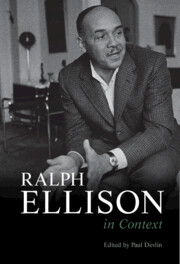Book contents
- Ralph Ellison in Context
- Ralph Ellison in Context
- Copyright page
- Contents
- Figures
- Notes on Contributors
- Abbreviations
- Introduction
- Part I Geographical, Institutional, and Interpersonal Contexts
- Part II Historical, Political, and Cultural Contexts
- Part III Literary and Critical Contexts
- Chapter 20 The Harlem Renaissance
- Chapter 21 Ellison’s Early Writings
- Chapter 22 The Wright School
- Chapter 23 Literary Modernism
- Chapter 24 Beyond Raglan’s Hero: Ellison’s Ritualist Influences
- Chapter 25 Sociology
- Chapter 26 The Soapbox Speech in Ellison’s Fiction
- Chapter 27 Postwar Literary Aesthetics
- Chapter 28 Ellison as Correspondent
- Part IV Reception and Reputation
- Index
Chapter 25 - Sociology
from Part III - Literary and Critical Contexts
Published online by Cambridge University Press: 14 January 2022
- Ralph Ellison in Context
- Ralph Ellison in Context
- Copyright page
- Contents
- Figures
- Notes on Contributors
- Abbreviations
- Introduction
- Part I Geographical, Institutional, and Interpersonal Contexts
- Part II Historical, Political, and Cultural Contexts
- Part III Literary and Critical Contexts
- Chapter 20 The Harlem Renaissance
- Chapter 21 Ellison’s Early Writings
- Chapter 22 The Wright School
- Chapter 23 Literary Modernism
- Chapter 24 Beyond Raglan’s Hero: Ellison’s Ritualist Influences
- Chapter 25 Sociology
- Chapter 26 The Soapbox Speech in Ellison’s Fiction
- Chapter 27 Postwar Literary Aesthetics
- Chapter 28 Ellison as Correspondent
- Part IV Reception and Reputation
- Index
Summary
A rich body of recent scholarship has commented on the depth of Ellison’s engagements with major developments in sociology and psychology, including direct engagements with the work of Robert Park, John Dollard, Gunnar Myrdal, and the Lafargue Clinic in Harlem. Ellison showed a sustained interest and concern with the new prominence of sociology and psychology in mid-century policy decisions in the U.S. Accordingly, his fiction and chapters consistently engaged with these disciplines’ claims to knowledge of African American culture as compared with other ways of knowing, such as naturalist fiction, Marxist analysis, music, and folklore.
Keywords
- Type
- Chapter
- Information
- Ralph Ellison in Context , pp. 270 - 279Publisher: Cambridge University PressPrint publication year: 2021

